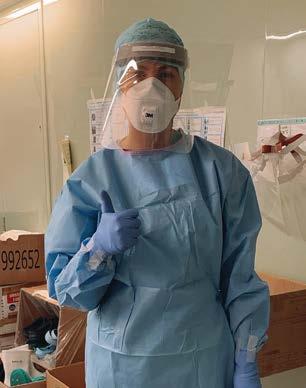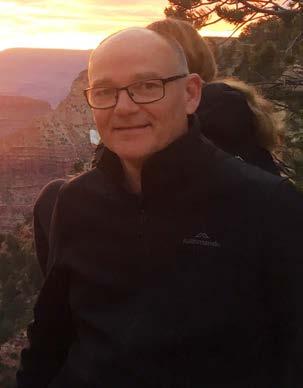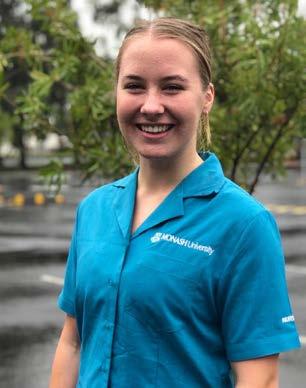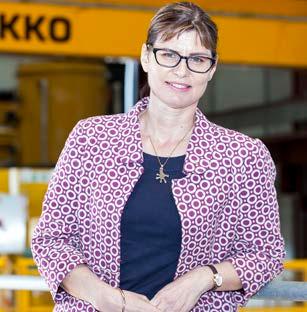
6 minute read
COVID-19: On the frontline
Old Collegian, Kate Titheridge (2012), is currently working as a nurse in the Intensive Care Unit at a hospital in Central North London. There, she provides care for suspected and confirmed COVID-19 patients.
“Working as an ICU nurse is very intense at a time like this,” said Kate. “The patients we are caring for are severely affected by the virus and need constant observations and care to survive.”
Advertisement
This means that Kate, along with her fellow healthcare workers, is putting her own health at risk to assist others. “The pressure sores from the personal protective equipment are a real issue when wearing them for hours upon hours,” said Kate. “With 12.5 hour shifts, it’s difficult to get significant rest and relaxation from the frontline environment.”
With the high demand and expansion of ICU wards, and a fast decline in the number of patient beds available, there is a concerning ‘number of patients to nurses’ ratio.
An appreciative community is finding innovative ways to show its support for those on the frontline.
Every Thursday at 8pm, people can be heard clapping and cheering for the National Health Service and essential workers, who continue to work despite the risks posed by the virus. “To hear so many people from next door and along the street showing their support and appreciation is heart-warming,” said Kate.
In the long term, Kate hopes that the Government will put measures in place to protect nurses and healthcare workers. She also believes that this will be a learning experience for all communities. “Helping out your neighbours, finding new ways to brighten someone’s day, in fact, any acts of kindness are responses I hope will continue in the future,” said Kate. Dr Brett Knight, current parent to three students, is Head of the Respiratory Medicine Unit at Ballarat Health Services. He has also been a Consultant General Physician at St John of God Hospital for 20 years.
Dr Knight believes there are a multiplicity of changes which have affected the domains of ‘work, home and spirit’, sparked by the coronavirus. “Each day begins with putting on my uniform and preparing mentally for a war with special pathogen COVID-19,” said Dr Knight.
Within Ballarat Health Services, Dr Knight’s team has assumed the role of the dedicated COVID Unit. The team is involved in the day-to-day triage, assessment and treatment of patients who may have acute COVID-19 infection.
“It has been very challenging keeping across the sheer volume of new information coming through about COVID-19 infections,” he said. “A significant part of my recent work has been in guidance, reassurance and advice to concerned medical and nursing colleagues trying to navigate the COVID-19 pandemic.”
Dr Knight is in awe of the ways in which various sections of the community have responded to the challenges posed by COVID-19, although there is much uncertainty surrounding the long-term implications of the coronavirus on the community.
These implications include adapting previous perceptions and experiences of ‘connectedness’ as humans, a stronger push for people to be vaccinated from viral diseases, and a need for doctors and patients to remain open to and aware of unusual patterns of disease in the future.
“There are some learnings for the community from bushfires with which Australians are very familiar,” said Dr Knight. “The ability of people to navigate COVID-19 infection and its consequences can be improved by asking one simple question: what would we do if one of us had the infection?”
He believes that by asking this question and working through the answers and consequences as a family, one can be better prepared for whatever may come. During these times of uncertainty, Dr Knight encourages the community to grasp “the letting go of what was, working through what is, and adapting to what will be.”
Old Collegian, Jelena Black (2018), is currently studying a Bachelor of Nursing at Monash University. On top of her first-year studies, she completed a Certificate III in Individual Support and currently works as Personal Care Assistant for an Aged Care facility in Melbourne.
The impact of COVID-19 has been felt amongst both the residents and staff of the facility. Restrictions have been put in place which require residents to stay in their rooms as much as possible and activities, such as bingo and exercise classes, have either been cancelled or limited to a small number of people.
“The coronavirus has resulted in residents becoming easily distressed. Many don’t fully understand what is happening – only that they can no longer see their families and that they are required to isolate themselves as much as possible,” said Jelena.
All residents’ temperatures are being monitored and staff are required to have their temperatures checked upon arrival at work. “Although challenging at times, we are there to provide as much support and information as possible to reassure residents during this difficult time,” said Jelena.


Top Kate Titheridge
Middle Dr Brett Knight

Dr Nicholas Kimpton Elizabeth Lewis Grey

Dr Nicholas Kimpton, parent of five Old Collegians, is working as a General Practitioner in Ballarat. Whereas previously patients would simply make appointments to discuss their medical issues, they now must be screened prior to attending the practice or are consulting their GPs over the phone and via telehealth links.
“The coronavirus has had a profound impact on every aspect of general practice,” said Dr Kimpton. “Like the rest of the health system, we are dealing with the evolving protocols for screening and limiting the potential spread of the virus and minimising the significant risk to our staff and selves.”
Dr Kimpton believes that the Ballarat community has been accepting of the restrictions imposed and are mostly negotiating them with common sense. “We seem less hurried,” he said. “The roads are quieter and pedestrians seem to be keen to say hello and smile even when giving each other a wide birth.”
Yet the long-term consequences of the virus are hard to gauge. “This shared experience will, hopefully, improve a sense of community in unity against a common foe. Nonetheless, it will be months, if not years, before we can really look back and see how we have evolved through this crisis.” Elizabeth Lewis Grey, parent of three Old Collegians and the Managing Director of Gekko Systems, is overseeing the GeVentor Project.
The project came about when the Committee for Ballarat approached Gekko Systems and asked if they would be capable of designing and building ventilators if necessary. Sandy Gray, Gekko’s Technical Director and Elizabeth’s partner, immediately started work on some quality designs and prototypes of the ventilator.
“The GeVentor Project is an exciting project with the objective to save lives,” said Elizabeth. Gekko Systems is working with specialists from the Anaesthetist Group and the project is being co-funded by the Victorian State Government and local community donors, including the Buninyong Community Bank and local individuals.
“I am extremely happy with how the Ballarat community has come together to support each other through COVID-19,” said Elizabeth. “Although there will be long-term economic consequences, maintaining physical and mental health through good discipline is essential in taking care of your community.”










